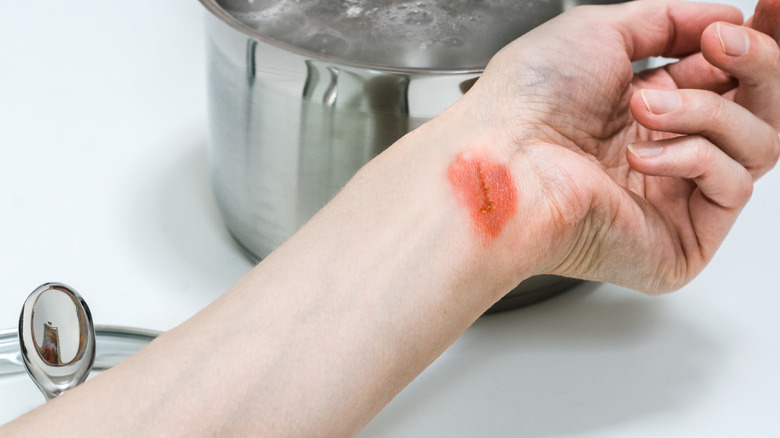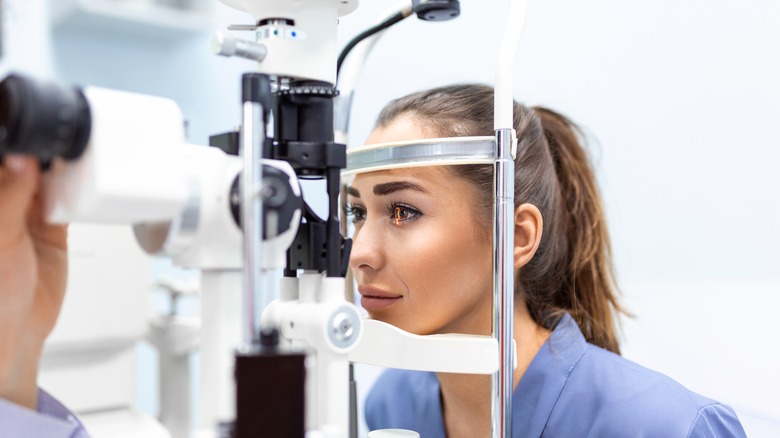You're Not Getting Enough Vitamin A If This Happens To You
If you associate vitamin A with vision health, you are correct. But you may only be "seeing" half the picture. This vitamin also has a role in several of your body's functions, including your skin and respiratory health (via Cleveland Clinic).
Vitamin A is an essential nutrient and fat-soluble vitamin (via Healthline). This means you must obtain it through foods and consume fat to help with its absorption, according to a 2013 article in Community Eye Health. Vitamin A is important for vision, assists in metabolism and cellular development, and is important for immunity and reproductive health (via Cleveland Clinic).
When it comes to eye health, Vitamin A helps keep in moisture to prevent corneal damage from severe dryness. Corneal damage can lead to blindness, according to Cleveland Clinic. Additionally, it provides the necessary pigments to keep your retina functioning well, so that you can see at night. Vitamin A also protects your skin and the linings of your organs, such as your lungs. It is also essential for supporting the alveoli structure (tiny air sacs) in your lungs to enable healthy breathing, according to a 2018 review in Nutrients.
Who is at risk for vitamin A deficiency?
Vitamin A deficiency is rare in the United States and other developed countries, according to Insider. The most severe effects of vitamin A deficiency are seen in young children and pregnant women of poor, developing countries, most notably in Southeast Asia and Africa, according to the World Health Organization (WHO). It can arise from malnourishment and become exacerbated from high rates of diarrhea, measles, and other infections.
Gastrointestinal disorders can also play a role in vitamin A deficiency. At-risk individuals include those with fat malabsorption or liver disorders (via Insider). Other gastrointestinal issues that may affect vitamin A absorption include Celiac disease, pancreatic insufficiency, and gastric bypass (via WebMD).
There may be subtle signs that you may not be getting enough vitamin A in your diet, according to Insider. For instance, low levels of vitamin A are associated with difficulty seeing in the dark (aka night blindness). Other symptoms include dry eyes, itchy skin, frequent skin infections, and delayed wound healing. Diagnosis of vitamin A deficiency is based on symptoms and a blood test (via Merck Manual). Night blindness is one of the first symptoms.
Night blindness
If you notice you are having more difficulty adjusting to the dark in a movie theatre or when you turn off your bedroom lights, it may be a sign you are lacking vitamin A, according to Dr. Khalid Saeed, for Insider. In fact, night blindness is an early warning sign you shouldn't ignore, according to a 2013 case study in the Journal of Optometry. If night blindness is untreated, it can progress into permanent vision loss. However, according to the authors of this study, if recognized early on and addressed with proper vitamin A treatment, it can be reversible. A 55-year-old woman with a history of Crohn's disease and malabsorption issues presented with night blindness for two years, obstructing her ability to drive at night. With 50,000 units of parenteral vitamin A monthly over 18 months, her night blindness was significantly improved.
Because vitamin A contributes to lubrication of the eye, deficiency of the vitamin can result in dryness and the formation of visually impairing foamy spots on the whites of the eyes, known as Bitot spots (via Cleveland Clinic). Corneal ulceration may also appear, also affecting the vision.
Dry eyes
Do you find yourself rubbing your eyes more often, or do they feel dryer than normal? You could blame it on the weather or allergies. But did you know that extreme dry eyes can be related to deficiency in vitamin A? According to Healthline, having abnormally dry eyes and tear ducts (i.e., xerophthalmia) is a progressive condition caused by a deficiency in vitamin A. And while dry eyes may be irritating, they can manifest into more serious outcomes. When the eye becomes severely dry, it can damage the retina and cornea, contributing to night blindness and permanent visual impairment if not treated, according to WHO.
Xeropthalmia is the leading cause of preventable blindness, and proper nutrition is key, according to Xerophthalmia. Treatment includes proper usage of eye drops, a home humidifier, sunglasses for outdoors, dietary adjustment for reversing vitamin A deficiency, prescribed supplementation if necessary, and long-term regular checkups.
Dry and itchy skin
Vitamin A is good for your skin (via Healthline). It not only fights inflammatory skin issues, but also promotes a healthy turnover of your skin cells. According to Insider, the top layer of your skin cells should sluff off and renew about every couple of weeks. Delayed turnover can lead to dandruff. Thus, if flaky, irritated, dry skin has you concerned, you may want to chomp on some more carrots (in addition to moisturizing).
Carrots are rich in beta carotene, which your body converts to vitamin A, according to SFGate. Did you know: One small carrot provides close to 300% of your daily recommended intake for vitamin A? And the good news is that getting your vitamin A from plant-based food sources is safe because the body converts carotenoids to the active form of vitamin A very slowly (via Merck Manual). One the other hand, oral supplementation can more quickly build up in the body and lead to serious health consequences (via Healthline).
Acne
There are a variety issues that may cause acne, including fluctuating hormones, stress, heredity, and high humidity (via Cleveland Clinic). But research also shows that acne may be linked to low levels of vitamin A (via Healthline). And according to Healthline, severe acne is especially indicative of this deficiency. Indeed, in a 2014 study involving patients with severe acne, vitamin A was one of three nutrients found to be significantly lower in those with acne versus the healthy skin control group.
Topical retinoids (synthetic forms of vitamin A) are often used to treat acne because they promote skin exfoliation and renewal. When it comes to more severe acne, the most commonly prescribed oral supplementation for acne is isotretinoin (aka Accutane), according to Healthline. But this drug can have serious side effects.
While diet may play a role in breakouts and exacerbating existing acne, diet alone may not be enough to eliminate acne altogether, according to the American Academy of Dermatology Association (AAD). The relationship between diet and acne remains controversial, according to a 2016 review in Advances in Dermatology and Allergology. Current standards of treatment include oral isotretinoin for those cases in which topical treatment does not resolve the issue (via AAD). Low dose, intermittent isotretinoin may be effective to treat persistent acne with reduced side-effect severity.
Weakened immunity
Vitamin A plays an essential role in immunity, according to 2018 review in the Journal of Clinical Medicine. It is also anti-inflammatory, which means it is protective against various diseases. It is also crucial to the formation of the skin and epithelial tissue, which is a "first line defense" against foreign invaders. When a person becomes deficient in vitamin A, epithelial cells shrink and the protective barrier of the skin and epithelial tissue is weakened, allowing pathogens to invade. Furthermore, the body is more susceptible to diarrhea and respiratory infections, the review authors say.
There may be a link between poor microbiota status in the gut and respiratory disease/infections, say researchers in a 2020 review in the Journal of Immunology Research. And according to a 2015 review in the Asian Pacific Journal of Allergy and Immunology, gut microbiota diversity is dependent on adequate vitamin A status. It not only regulates immune T cells to control infections as they arise, but also keeps the gut colony active and healthy to promote immunity.
Blurred vision
Blurred vision can be an insignificant problem, and will often go away on its own, according to Specscart. According to Healio, your eyes produce fewer tears while you sleep. And when your eyes become dry, blurry vision can result — which is why you may often experience blurriness in the morning (via Healthline). Blinking helps re-moisten the eyes to quickly resolve the issue. Eye drops are another simple, safe solution (via American Academy of Ophthalmology).
But when blurred vision becomes more frequent, your vitamin A status may be to blame. Vitamin A deficiency is a cause of dry eyes; and lack of sufficient moisture makes your eyes more susceptible to damage and infection, according to the Mayo Clinic. You can protect your eyes by eating foods rich in vitamin A, which will help maintain moisture and protect the conjunctiva of the eye (via Specscart). It also keeps the cornea safe for clear and accurate vision.
Hair loss or damage
If your hair is starting to get brittle and the frizzies seem never-ending, you may want to reassess your hair care routine and be sure you are getting plenty of vitamin A via your diet. Vitamin A is important for cell growth, and therefore supports one of the fastest growing tissues in your body –- your hair (via Healthline). It also helps your skin create sebum, which moisturizes your scalp to keep your tresses hydrated.
And while vitamin A can keep your hair strong and healthy, too much of a good thing can wreak damage. According to SciTechDaily, excess vitamin A can lead to hair loss. Overdoses of vitamin A can also be toxic to the liver and contribute to bone loss, among other serious side effects including vomiting, diarrhea and vertigo, according to the Mayo Clinic. One should not exceed over 10,000 mcg of vitamin A per day.
The recommended daily allowance for vitamin A is 900 mcg for men and 700 mcg for women (via Mayo Clinic). Including plenty of provitamin A-rich foods (beta-carotene-containing fruits and vegetables) in your diet will not likely cause toxicity (via Merck Manual). According to the Harvard T.H. Chan School of Public Health, high levels of beta-carotene (a precursor to vitamin A) are not harmful, as the body converts it to vitamin A only as needed.
Dry, brittle nails
Healthy, strong nails aren't just a fashion statement, they can also say a lot about your health (via Everyday Health). If you are noticing dry, cracked edges, you may want to ace up your dietary routine to get in that vitamin A (and C and E), as well as calcium, and B vitamins, too (via Healthline and Medical News Today). Lackluster nails may be a sign of vitamin deficiency, according to Everyday Health. And vitamin A deficiency can lead to dry, brittle nails just as it may lead to dry skin and hair, according to registered dietitian Billi Green for Insider.
Nails are made up of keratin — a strong protein also found in your skin and hair (via Everyday Health). Vitamin A is a nutrient that is especially important for keratin synthesis, according to Healthline. To support the keratin structure of your nails, skin, and hair, consume vegetables such as kale and sweet potatoes, which contain provitamin carotenoids that are converted in your body to Vitamin A.
Fertility problems
Difficulty getting pregnant may be related to an undiagnosed vitamin A deficiency, according dietitian nutritionist Billi Green for Insider. A vitamin A deficiency can lead to fertility problems in both men and women. Vitamin A assists in those hormones that boost fertilization of the egg in the uterus, and it also acts as an antioxidant to protect sperm from damaging free radicals. What's more, it helps a woman's body produce the cervical fluid which is essential to a healthy pregnancy.
Historically, vitamin A has been noted for its role in reproductive health. In the early 1900s, scientists recognized the importance of vitamin A for embryo development, particularly the formation of the eyes, according to a 2011 article in Nutrients. The researchers also point out the importance of vitamin A for aiding in sperm production, implantation, and the signaling processes to initiate embryonic growth.
Gastrointestinal issues
Vitamin A is necessary for mucosal secretion in the gut (via Nelson Textbook of Pediatrics). This helps form a protective barrier in the gut lining against pathogens, toxins, and stomach acid, according to a 2020 review in Frontiers of Cellular and Infection Microbiology. Loss of a protective layer can lead to diarrhea (via Nelson Textbook of Pediatrics). Infection can also result from a weakened epithelial layer in the gut, manifesting in inflammation and poor immunity. For instance, in an observational study involving 2,774 school-age children in Bogota, Colombia, poor vitamin A status was linked to diarrhea, vomiting, as well as increased infection and morbidity, according to 2014 study in the Journal of Nutrition.
And while vitamin A deficiency may lead to impairment in gastrointestinal tissue, resulting in stomach distress and higher rates of morbidity (via Nelson Textbook of Pediatrics), excess of the vitamin can be toxic and present similar concerns, involving nausea and diarrhea (via Insider). Because fat-soluble vitamins can build up in the body and don't get excreted by the urine when not needed, vitamin A supplementation should only be taken as necessary.
Poor wound healing
Wounds that take longer to heal may result from low vitamin A status, according to Insider. That's because vitamin A is necessary for the production of collagen, which plays a role in skin integrity. In fact, vitamin A may help reverse collagen damage in natural aged and sun-damaged skin, while increasing collagen synthesis, resulting in healthier skin, according to a 2000 study in the Journal of Investigative Dermatology. In the study of 72 individuals divided into four age groups from 18 to 80+ years, collagen decline was assessed and analyzed, emphasizing the significance of collagen decline in aging and its similarity (and overlap) to sun-aged skin. A separate group of 53 80-year-olds received topical application of 1% retinol (vitamin A) over seven days, whereby skin cell growth and collagen production was improved.
What's more, in wounded tissue, vitamin A stimulates skin cell turnover, speeds the rate of renewal, and helps restore the structure of the epithelial tissue, according to 2019 review in Nutrition and Burn Injury.
Diagnosis and treatment of vitamin A deficiency
The eyes may be the windows of your health, according to ophthalmologist Rishi P. Singh, speaking to the Cleveland Clinic. A routine eye exam may detect an underlying medical condition such as high blood pressure and diabetes. As such, a more thorough exam can reveal nutrient deficiencies, such as inadequate vitamin A status (via MSD Manual). If you are having trouble seeing in the dark, rod scotometry and electroretinography are two tests that can determine if vitamin A deficiency is a root cause.
Vitamin A deficiency may also be determined via a blood test where serum levels of retinol are measured (via MSD Manual). But because the liver stores large amounts of vitamin A, blood levels decrease once the deficiency is severe. The normal range is 28 to 86 mcg/dl. Thus, history of symptoms is an important part of investigating vitamin A status (via Merck Manual). What's more, an acute infection may reduce vitamin A status in the blood (via MSD Manual). Therefore, a therapeutic trial of vitamin A supplementation may help confirm the diagnosis. Dietary deficiency of vitamin A is treated with 60,000 units of oral vitamin A palmitate daily for 2 days, then the dose is reduced to 4,500 units per day. A doctor will determine if the dose needs to be adjusted (i.e., if vomiting or malabsorption occurs).
Vitamin A in your diet
Fortunately, vitamin A deficiency is not so common in the United States thanks to an adequate and readily available food supply (via National Institutes of Health). Unless you have liver or malabsorption issues, you will likely be able to obtain enough vitamin A via your diet (via Cleveland Clinic).
Preformed vitamin A (i.e., retinol) is the active form of vitamin A you get directly from animal products (via Healthline). Good sources of preformed vitamin A include oily fish, eggs, milk yogurt, cheese, and liver (via NHS). Because liver is a rich source of vitamin A, you may want to limit your intake to once a week to prevent toxicity. Provitamin A carotenoids (including beta-carotene) are found in plants and are converted in the body to the active form of vitamin A (via Healthline). Beta-carotene sources may be consumed plentifully because the body converts these to vitamin A only as needed (via Harvard T.H. Chan School of Public Health). These include plant foods such as spinach, carrots, and sweet potatoes (via NHS). You may also reach for those hearty leafy greens such as kale and collard greens to get plenty of beta-carotene in your diet (via Healthline).














